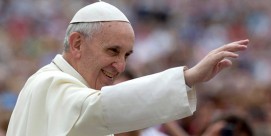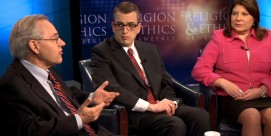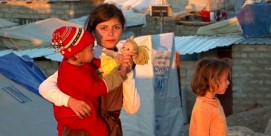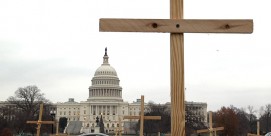FRED DE SAM LAZARO, host: Coming up, our annual look ahead to the stories we expect to be the top religion and ethics news of 2016.
Welcome. I’m Fred De Sam Lazaro, sitting in for Bob Abernethy. It’s good to have you with us for our annual look ahead at what the top religion and ethics stories of the New Year might be. E.J. Dionne is here. He’s a senior fellow at the Brookings Institution in Washington, a columnist for the Washington Post, and a professor at Georgetown University. Jerome Socolovsky is the editor-in-chief of Religion News Service. And Kim Lawton is the managing editor of this program. In preparation for our discussion, Kim talked to a variety of scholars and religion experts about what they’ll be watching.
Q: What will you be watching in 2016?
PROFESSOR DAVID GUSHEE (Christian Ethics, Mercer University): The terrorism issue and then the blowback or fallout related to civil liberties, Muslims, immigration and refugees—that cluster of issues.
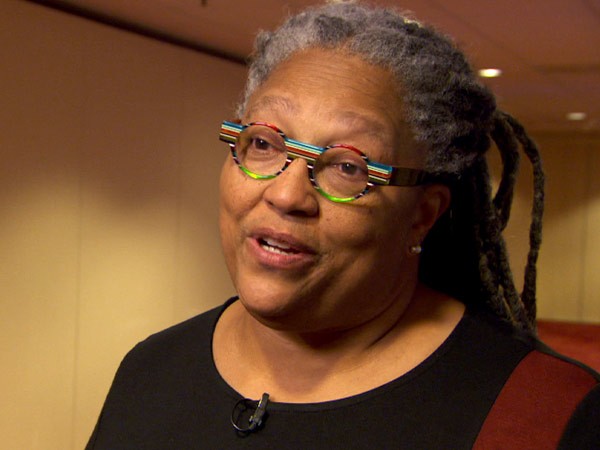
PROFESSOR EMILIE TOWNES (Dean of the Divinity School, Vanderbilt University): Black lives matter will continue to gain a force, I think. I don’t see the youth of today stepping back from taking up the challenges of creating a better society.
JULIA LEYVA (Student, Duke Divinity School): The Syrian refugee crisis and how we can balance the nation’s concern for safety which, with, what we feel is our call to be compassionate to our neighbor and to care for everyone.
PROFESSOR KATHLEEN FLAKE (Chair of Mormon Studies, University of Virginia): I’m interested in how the marriage debate—what is the nature of marriage? I’ll be interested in how that unfolds in the various American denominations.
PROFESSOR LESLEIGH CUSHING, (Religion and Jewish Studies, Colgate University): I’m anxious, worried, concerned about Israel and Palestine and feel increasingly that solutions seem farther and farther away rather than closer.
REV. RUSSELL MOORE (President, Southern Baptist Ethics & Religious Liberty Commission): What’s going to happen to persecuted religious minorities around the world? That’s at the top of my list. Will the world community be able to protect, for instance, ancient Christian communities in the Middle East?
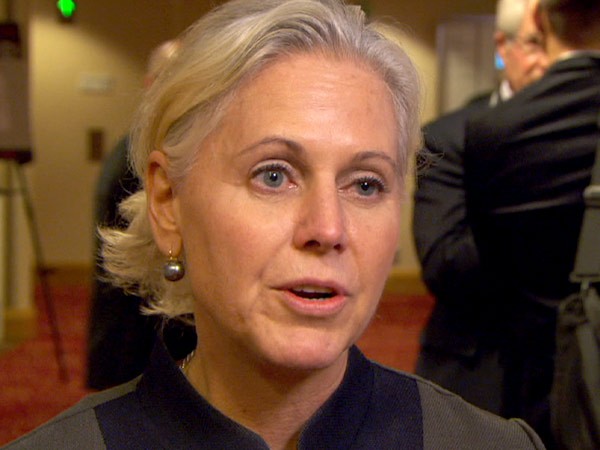
REV. SERENE JONES (President, Union Theological Seminary): For me, the single biggest question is, are religious communities and their traditions going to be mobilized for good or for evil? And how do we participate in the movement for good?
Q: What will be key in the elections?
PROFESSOR OMID SAFI (Director, Duke Islamic Studies Center): There’s always this race towards the extreme that happens in both parties, because for their primaries they have to appeal to their base, and then for the general election they’re going to run back to the middle.
PROFESSOR THOMAS TWEED (American Studies Department, University of Notre Dame): How do the parties deal with the nones, the so-called unaffiliated? It’s a rising proportion of the population. Does this mean a significant shift toward Democrats? Does it mean, are the ways in which Republicans might reach out to them in ways that we can’t now imagine?
TONY JONES (Author, Did God Kill Jesus?): I don’t think the evangelical voting bloc is so tight, so how they fight for the vote of religious people will be interesting.
MOORE: Some of the questions that we’ve had emerge over the past several years that we never really had to ask before, about will a president safeguard the free exercise of religion?
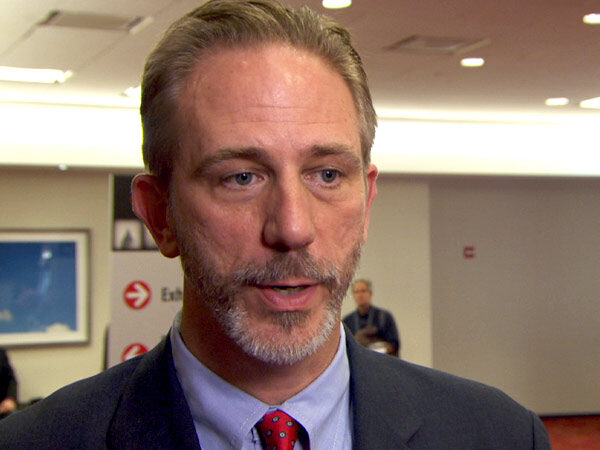
GUSHEE: The sense of cultural division is so profound. I mean, I had once said the culture wars, we might be able to get beyond them. And in some ways, I just think they’re changing shape. I don’t think we’re getting beyond the culture wars.
SERENE JONES: I hope that, at the end of this election period, we come out with a clearer sense of who we are as a nation, and that it embraces our diversity and includes our religious diversity.
Q: What will be key for Pope Francis?
TONY JONES: Of course, we’re all watching Pope Francis. I think the world will continue to watch Pope Francis. I mean, it’s news when he stumbles in St. Peter’s, you know, after giving the Mass.
SAFI: I’m watching the issue of what happens to the critique of capitalism that the pope has been introducing. He’s taken a page out of liberation theology and introducing it to global Catholic audiences in a way that’s resonating with many, many Catholics—but not just Catholics.
TWEED: I think he has some real difficult political issues with the Vatican. I’m looking to see, do the internal reforms continue? What’s the next statement? What does he do on family issues? Does he edge in any way for greater participation of women in the church?
Q: Are there some unexpected issues that may emerge?
TONY JONES: Some evangelical leaders are going to come out in favor of GLBT people and issues in marriage equality, bigger ones that have even come out already. I think that will be big news.
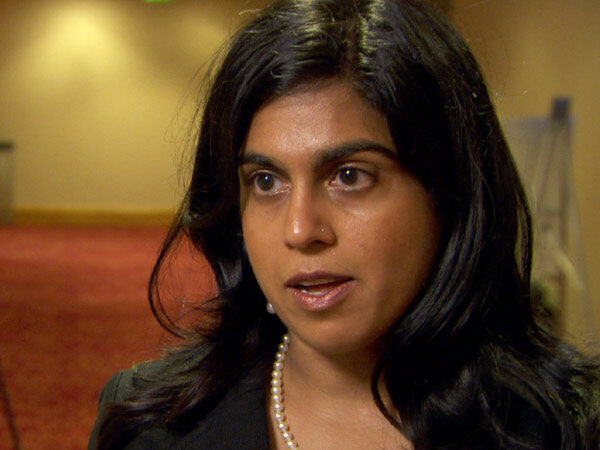
AYESHA CHAUDHRY (Fellow, Radcliffe Institute for Advanced Study, Harvard University): How do we think about gender politically, ethically, theologically? How do we reconceive of a notion of a gender-equitable Islam?
GUSHEE: The torture issue may resurface if we have another terrorist attack on our soil. That issue was never really resolved.
RUMEE AHMED (Fellow, Stanford Humanities Center, Stanford University): Right now there’s a fascinating conversation about sharia law that’s happening within and outside the Muslim community, and that’s starting to shape political events all over the world.
TWEED: I’m interested in looking at what happens in Cuba. Does—do the churches take a lead in opening up there, and how does that affect the changes there?
SAFI: Is there going to be a manifestation of people who are committed to the redemption of their societies acting out of their religious conviction, not only for the safety and well-being of their own community, but actually for all communities?
Q: What gives you hope for 2016?
TOWNES: There’s still people out there who believe that justice is possible, and they work like hell for it.
AHMED: We’re also seeing more and more Muslim voices in the public sphere who are commenting, and it might be that this heightened tension is leading more people to speak up, whereas they might not have before, and they’re starting to reclaim their Islam.
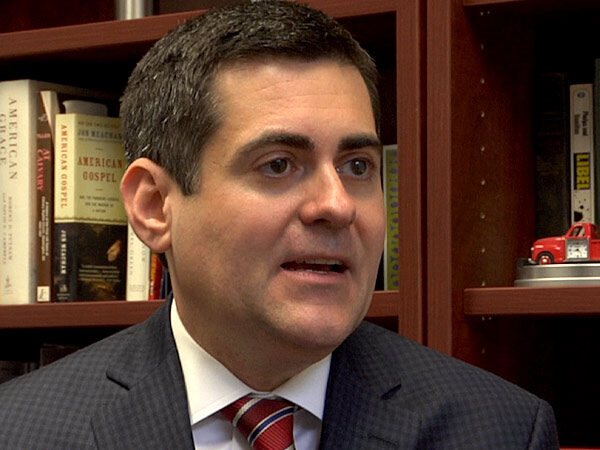
MOORE: A sense of longing among people for something more than what we have seen in recent years, of endless division among one another and just the piling up of material goods. I think there’s a longing for something different.
CHAUDHRY: When we turn on the TV, we notice all of the horrible things that people are doing and saying, but there’s a lot of amazing people in the world as well who are not actually acting hatefully and are opening their homes and opening their communities and really being ethical, moral, upright citizens and, like, sharing that citizenship with other people.
DE SAM LAZARO: Great report, Kim.
KIM LAWTON: Thank you.
DE SAM LAZARO: And thanks for ending it on a hopeful note because there is a lot that’s so troubling.
LAWTON: I was listening to people and they were, yeah, death, destruction, concerns, and I just started asking people, well, is there anything that gives you hope? And it was nice to hear that from them.
DE SAM LAZARO: Well, I’m sorry to bring us back—
LAWTON: Speaking of death and destruction.
DE SAM LAZARO: To what is troubling a lot of Americans today, in the wake of the events in Paris and San Bernardino. There’s a great deal of concern about security out there, a lot of anti-Islamic rhetoric fueled in and perhaps by the political campaigns. Are the voices of religious leaders who are calling for calm being drowned out in all of this? Are they just not being heard at all, and where do you see this leading as the election campaigns crank up?
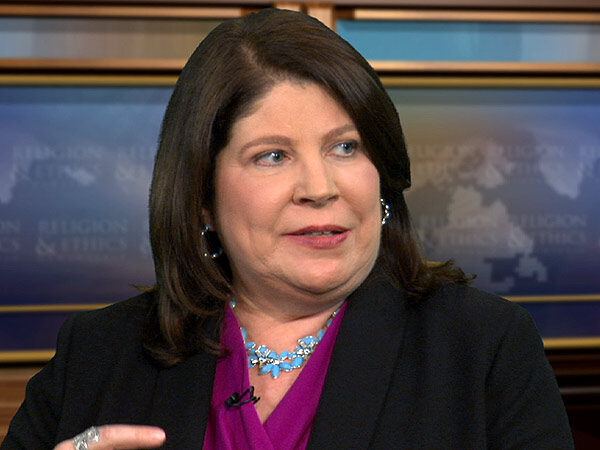
LAWTON: Well, I do think the fact that we are in an election season just heightens everything and does ramp it all up. The religious voices are out there, and they’re not getting as much attention. You know, honestly when people are out there you want to hear the noise, and people like to hear the debate and all of that. They don’t necessarily—it seems like they’re not as interested in hearing about interfaith groups coming together, but that has been happening, and it’s been happening a lot. It sort of reminds me of, a lot of times when a terrorist attack happens and a Muslim is responsible, and US Muslims say, “We are condemning it, and nobody is listening.” And the same thing—the interfaith community is out there calling for people to respect one another, and they are there, and I hope that they are being listened to.
DE SAM LAZARO: But the loudest bullhorns belong to the political candidates, and they will get louder, from all accounts, in the year ahead. Where do you see this all leading?
E.J. DIONNE: Well, in fact, in the campaign you have a real split among the candidates, particularly in their attitude toward Muslims. When Donald Trump came out with his proposal to block all Muslim entry into the United States—he said it temporarily—there was a lot of push back. All the Democrats pushed back very, very hard and condemned Islamophobia, but there were a number of Republican, most of the Republican candidates said at least something about this being a terrible idea. What could happen is that it could become a more partisan division, because if you looked at the final Democratic debate of last year, they were really saying that the Democratic Party is very different on this than the Republicans are. The Republicans, however, may decide it’s not in their interest to push this hard, and I think there are some Republican candidates—Jeb Bush, Marco Rubio—who think it’s a very bad idea, because the Republicans have been losing ground among Asian-American voters altogether. So I think it will be a real test in the campaign, and it will create divisions inside and between the parties.
LAWTON: And even in religious outreach I think that, you know, during this time of year there are these official campaigns to reach out to the reliable religious constituencies, and even for the Republicans you have Catholics are a strong constituency, especially white Catholics for Republicans; evangelicals; and we’ve seen leaders from both of those groups really calling for an end to some of the harsh rhetoric that’s out there. So if these candidates want to reach out in some of those faith communities they may have to look at whether that’s a winning strategy. I don’t know that that’s a final answer yet, because there is some suggestion that maybe that issue does have resonance amongst some faith groups, but at the leadership level there is widespread concern.
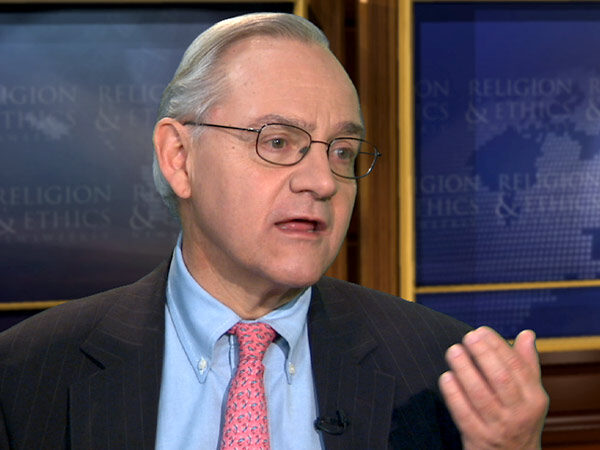
DIONNE: No, and I think that’s really important, and, I mean, at the end of the year Cardinal Wuerl, cardinal of Washington DC, Cardinal O’Malley in Boston, just to speak of the Catholics, spoke out very strongly on this, and you’re right. There are people across the religious spectrum regardless of their politics who understand the danger of this feeling against other faiths.
DE SAM LAZARO: And I believe there was an actual study, and something tells me it was a Pew study, and you made reference to this in last week’s program, Kim, about how anti-Islamic sentiment is much greater during election years as opposed to the immediate aftermath of major events like 9/11 and the Boston bombing, for example. Are we likely to see this calm down once we get to the general election phase of this, do you suppose?
JEROME SOCOLOVSKY: Well, it is interesting that the peaks of anti-Islamic sentiment in this country were during the Ground Zero mosque controversy, which I believe is also before an election, and now. And I think—I don’t know if I could say the worst is over, but pretty soon the worst should be over, because during the general election, as Professor Safi there said, the candidates will try to reach for the middle.
LAWTON: It’s interesting that when you have these times, and it seems like there is a lot of tension, but at the same time we are talking about these issues, we are talking about tolerance, we are talking about religious diversity. Those aren’t issues that always make it in a campaign season. So there is a flip side to the negativity is there are issues that we are talking about. What does it mean in the United States to be a nation of diverse people, of immigrants? And, you know, immigration at the end of last year really was looking at should we allow in Iraqi and Syrian refugees because of security? But there are a whole lot of other immigration questions that I think will be coming up in this election season as well.
DIONNE: I’m glad you walked into the what gives you hope sentiment in your video.
DE SAM LAZARO: But on the immigration issue, it’s also noteworthy from a different study that this year there were more people crossing southerly along the Mexican border than going north for the first time, and yet immigration is a major issue, and I’m just wondering how that plays out in the religion landscape, where so many churches are actively courting, for membership, Hispanic populations?
DIONNE: I think there may be some disconnect between the leadership of the churches and the members of those churches, particularly on the Christian side. Both the Catholics and the evangelicals have a vital interest in protecting Latinos, because they’re appealing to Latinos—
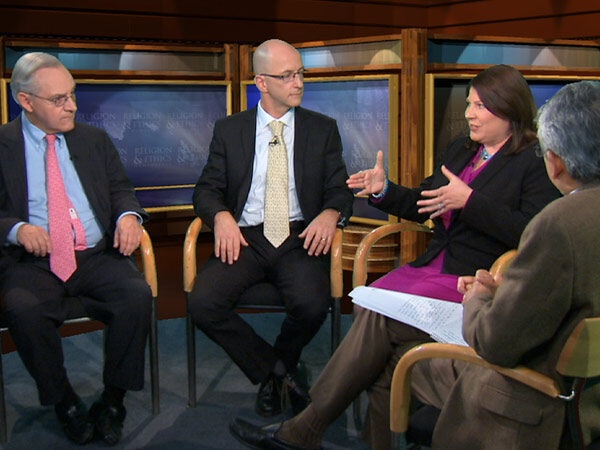
DE SAM LAZARO: Mormons as well.
DIONNE: —for membership, and Mormons as well.
LAWTON: And they’re already in the congregations.
DIONNE: Right, and so I think the leaders of these churches are speaking out very strongly, but there’s polling that suggests that in the rank-and-file in the more conservative traditions there is a great deal of opposition to immigration, and particularly illegal immigration. And so I’ve been wondering for a long time, is there ever a coming together between elite opinion in the churches and opinion on the ground? It should be said that there are an awful lot of Americans of all views who really want this settled, so it’s not as if the entire country wants to shut the borders down. That’s not true at all. But Congress’s inability to act on this issue I also think has heightened frustration. It’s a paradox that people who are critical of the immigration reform bills say they would be a bad idea, and yet their failure to pass only feeds the sentiment against Washington and on this question.
LAWTON: And the issue is going to come up when we have Pope Francis visiting this hemisphere again. He’ll be, in February, in Mexico, and many people expect he’ll be at the border, and it will be an interesting issue. And who knows, is immigration the climate change issue for the pope of 2016? We’ll see.
DIONNE: He’s been very outspoken all the way through, including about Europe, not just about us.
LAWTON: Right.
DE SAM LAZARO: Speaking of a broader tent in church congregations, do you see more acceptance from different denominations of GLBT people?
DIONNE: I think you’re seeing a shift on that issue that goes back 10 to 20 years. It’s one of the most rapid shifts in public opinion we’ve ever seen in the United States, and again just as the churches, the Christian churches have an interest appealing to Latinos, so do the churches have an interest in bringing young people back into the fold. When you look at the people who say they have no religious affiliation, those numbers are exceptionally high in the millennial generation. They’re going over 30 percent now. This is an issue where there is very close to unanimity of view among young people in favor of gay rights and gay marriage, and it’s a real challenge to church leaderships, particularly in the conservative churches. Do they maintain opposition at the risk of really sort of closing themselves, pushing themselves away from younger people, or do they find another way of talking about it?
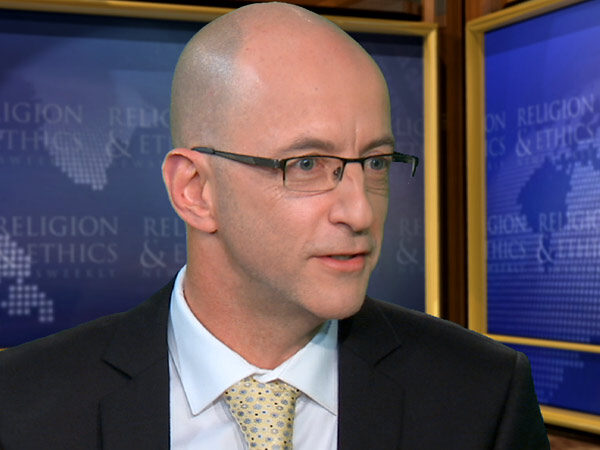
SOCOLOVSKY: Well, I think conservative churches want to draw lines. They want to say, “This is what we think about marriage. We are not anti-gay, we just think that marriage should be between a man and a woman,” and the challenge for them is going to be to voice that and express that in what appears to wider society to be a very humane way.
LAWTON: And without changing their positions in some cases. So, you know, there’s talk about being kinder and gentler on the issue, but the reality is many of them aren’t changing their position. I’m going to be watching especially this year the United Methodist Church, a mainline denomination, will be having its general meeting, and this is a denomination that has really struggled on this issue because it’s a very diverse denomination. There are people from Africa as well, church members in other parts of the world that are more conservative on this issue. And that church has been trying to figure out what do we do? There are ministers within the denomination that want to perform same-sex weddings, and there are many that are very opposed to it, so how does that denomination try to straddle both of those points of views?
DIONNE: They are the ultimate big church, or they are one of the ultimate big churches. When you think historically, they have gone politically from right to left. And just think in recent years, Hillary Clinton is a Methodist, and George W. Bush was a Methodist by marriage. He used to go to a Methodist church. They both speak for real traditions inside that church, and theoretically they’re all part of the same church.
DE SAM LAZARO: But the growing congregations are the most conservative, are they not, globally speaking?
JEROME SOCOLOVSKY: That’s correct. In Africa, in Latin America, in Asia. And there is also immigration to this country from those countries who are helping the ranks of, let’s say, Pentecostals or conservative evangelicals. In America we sometimes forget that we are a minority on this view worldwide, and some of these churches like the United Methodists have congregations overseas, too.
DIONNE: It’s a real challenge to be more liberal traditions, or to more liberal people inside big churches, Methodist, Catholics, and others—
LAWTON: Episcopalian, Anglican.
DIONNE: Because I think one of the things sociologically that’s happened is that people who 20 years ago might have belonged to those churches have shifted closer to agnosticism or in some cases atheism, or for whatever reason have pulled away from religion. I think those churches are going to be looking a lot at that category the pollsters have talked about, “spiritual but not religious.” We could sit here all day and try to figure out what exactly that means, but that is a very large group within this, within the millennial generation, and they’re going to have to start thinking about how to grow again.
DE SAM LAZARO: The US Supreme Court is expected to issue a big ruling on contraceptive—in a contraception case, and, Kim, why don’t you tell us a little bit about how this is different from the well-known one about Hobby Lobby? What’s different about this particular case, and what are its ramifications?
LAWTON: It is very complicated, because a lot of people say it’s about contraception but it’s about religious liberty questions as well. So it’s all mixed together. The court’s going to look at whether some faith-based groups, especially there’s universities, archdioceses, an order of nuns, the Little Sisters of the Poor—to what extent they can get an exemption from the Affordable Care Act, which provides contraception services and tries to mandate that employers provide those services. And so these groups for religious reasons think that contraception is wrong. Some of them believe certain methods are abortion, in fact, and so they don’t want to provide it, and they don’t want to even sign a form saying they don’t want to provide it. And the government has tried to figure out an accommodation, but these groups say that it violates our religious liberty, and so the court’s going to try to sort that out. Now, yes, two years ago the justices said that the group Hobby Lobby, because it is a closely held business, closely held by families that have particular religious believes, that they didn’t have to provide, they could be exempt from providing that. So the question is how far are they going to let some of these religious groups be exempt?
DIONNE: It’s a very peculiar controversy and case, because the Obama administration, after great controversy, went out of its way to create an exemption, and what’s at issue are some people who say that even signing the papers saying we don’t want to provide this is in some way authorizing the government to provide it, so we don’t even want to sign the paper, and that’s a bit peculiar. I’m very curious how the court is going to deal with that. Are they going to agree that even signing this paper is somehow complicity in providing contraception?
LAWTON: And the cases really become this symbol for, you know, the heavy hand of the government reaching in and telling us how we exercise our religious beliefs, and that’s an issue, whether you’re talking about same-sex marriage and where the limits are there, as well as this issue, that for many people of faith this issue has become very potent. You know, is the government in some way restricting my ability to exercise my religion? And that’s how it’s framed, and it will be interesting to see if the court frames it the same way.
DE SAM LAZARO: Israel-Palestine: this is the perennial issue that one talks about at the start of the year. It’s been relatively overshadowed by events in Syria in recent months. Anything you would look for on that frontier? Jerome?
SOCOLOVSKY: Well, I think it’s overshadowed by those conflicts, but everybody’s watching those conflicts, and as ISIS kind of creeps down through central Syria towards Israel I know there’s a lot of fear among Israelis of something like that coming into their country, so prospects for the peace process are not great as long as all of this is going on. And I don’t know, how many years has it been, has it not worked? Who’s going to say it would work this year?
LAWTON: And we really have seen the ramping up of the religious dimensions of the conflict, where the Temple Mount, to Muslims the Noble Sanctuary there in Jerusalem, the holy sites last year really became flashpoints, and so that drew lots of religious people into advocacy as well, and concerns about those holy sites make such a difference in the peace process.
DIONNE: And we’ve been saying for some years, a lot of people have been saying that time is running out on the two-state solution, which has been kind of the hope of people who wanted to reach some kind of settlement, and I think the time really is running out. At some point that prediction is going to turn true, and then it becomes very hard to see, at least from my point of view, how you sort this out. And yet there is no sign of, there’s no reason, sadly, to be optimistic that we will make any progress in that direction.
DE SAM LAZARO: I want to wrap up this whole issue coming back to where we started practically. I was struck by recent reports about how houses of worship in the United States, churches, synagogues, and especially mosques, are beefing up their security preparedness in anticipation of terroristic incidents, and I’m just wondering how you see the landscape, the religion landscape being altered going forward now? Is this something that’s here to stay now, where you have security in the back of church gatherings?
SOCOLOVSKY: I mean, this is something that—I lived in Europe for almost 20 years, and you would see it at synagogues throughout Europe since the 70s—somehow religious life goes on in those, I don’t know if in all of Europe, given its secularization, but certainly in those communities. It goes on. It can be done. It’s a sad state of affairs, I have to say, that in this country it’s happening.
DIONNE: When Franklin Roosevelt said we have nothing to fear but fear itself he was making a political, not a religious, statement, and yet I’ve always thought of that as a deeply religious statement, and you wonder in the coming year will we find a balance between fears which are legitimate, people are not crazy to worry about these things, and yet we can kind of scare ourselves to death as a nation, and if we don’t, and Europe lived for a long time with the terrorist threat back in the 70s and 80s. I think we have to find a way to protect ourselves, yes, but not to live in constant fear, because I think the fear creates problems all its own.
DE SAM LAZARO: Very good. On that note, and hopefully things will get better in year ahead. We’ll be watching it and have you back on future programs here. Thanks very much to E.J. Dionne, Jerome Socolovsky, and Kim Lawton.
DIONNE: Happy New Year.
DE SAM LAZARO: Happy New Year.











